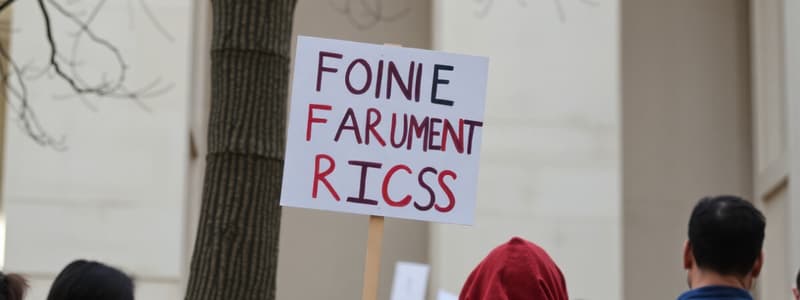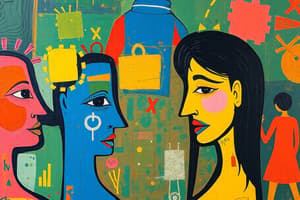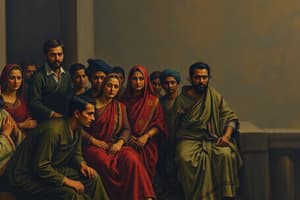Podcast
Questions and Answers
What must the government do in cases where tribals have been evicted from their lands?
What must the government do in cases where tribals have been evicted from their lands?
- Ignore their situation
- Provide them with farming tools
- Compensate them and create rehabilitation plans (correct)
- Help them return to their lands immediately
The existence of a law guarantees that everyone will follow it in practice.
The existence of a law guarantees that everyone will follow it in practice.
False (B)
Name one law that provides rights to Dalits for dignity and equality.
Name one law that provides rights to Dalits for dignity and equality.
The Scheduled Castes and Scheduled Tribes (Prevention of Atrocities) Act
Governments often take land from tribals for industrial projects, but must compensate them for _________.
Governments often take land from tribals for industrial projects, but must compensate them for _________.
Match the following groups with their respective rights or provisions:
Match the following groups with their respective rights or provisions:
What does Article 17 of the Constitution state regarding untouchability?
What does Article 17 of the Constitution state regarding untouchability?
Fundamental Rights are exclusively available to the privileged classes in India.
Fundamental Rights are exclusively available to the privileged classes in India.
Name two ways marginalized groups have drawn on their Fundamental Rights.
Name two ways marginalized groups have drawn on their Fundamental Rights.
Article 15 of the Constitution prohibits discrimination based on __________.
Article 15 of the Constitution prohibits discrimination based on __________.
Match the articles of the Constitution with their main focus:
Match the articles of the Constitution with their main focus:
Which of the following is a consequence of invoking Fundamental Rights by Dalits?
Which of the following is a consequence of invoking Fundamental Rights by Dalits?
The practices of untouchability are now tolerated by the government.
The practices of untouchability are now tolerated by the government.
What is the daily wage for those working in urban municipalities?
What is the daily wage for those working in urban municipalities?
The practice of untouchability has been completely eradicated in India.
The practice of untouchability has been completely eradicated in India.
Name one group of manual scavengers mentioned in the content.
Name one group of manual scavengers mentioned in the content.
The Prohibition of Employment as Manual Scavengers and __________ Act came into force on 6 December 2013.
The Prohibition of Employment as Manual Scavengers and __________ Act came into force on 6 December 2013.
Match the following groups with their locations:
Match the following groups with their locations:
What did the Safai Karamchari Andolan assert in their PIL filed in 2003?
What did the Safai Karamchari Andolan assert in their PIL filed in 2003?
The 1993 law completely eliminated the need for manual scavengers in India.
The 1993 law completely eliminated the need for manual scavengers in India.
What did the petitioners ask the Supreme Court to enforce?
What did the petitioners ask the Supreme Court to enforce?
The Safai Karamchari Andolan filed a PIL in the Supreme Court to address ongoing __________ issues.
The Safai Karamchari Andolan filed a PIL in the Supreme Court to address ongoing __________ issues.
When was the Employment of Manual Scavengers and Construction of Dry Latrines (Prohibition) Act passed?
When was the Employment of Manual Scavengers and Construction of Dry Latrines (Prohibition) Act passed?
What does the 1989 Act aim to prevent regarding land ownership?
What does the 1989 Act aim to prevent regarding land ownership?
The practice of manual scavenging is primarily performed by men.
The practice of manual scavenging is primarily performed by men.
List two provisions in the 1989 Act.
List two provisions in the 1989 Act.
Manual scavenging exposes workers to ______ hazards.
Manual scavenging exposes workers to ______ hazards.
Match the following terms with their descriptions:
Match the following terms with their descriptions:
What is the role of organizations like Safai Karamchari Andolan?
What is the role of organizations like Safai Karamchari Andolan?
The act defines morally reprehensible actions as those that are socially acceptable.
The act defines morally reprehensible actions as those that are socially acceptable.
What does the term 'morally reprehensible' mean?
What does the term 'morally reprehensible' mean?
What did Dalit groups demand to address the violence against them?
What did Dalit groups demand to address the violence against them?
Dalit women and young girls are primarily employed in the job of ______.
Dalit women and young girls are primarily employed in the job of ______.
Adivasi people faced no violence while organizing for their rights and resources.
Adivasi people faced no violence while organizing for their rights and resources.
What type of work conditions do manual scavengers typically experience?
What type of work conditions do manual scavengers typically experience?
What kind of crimes does the Act discussed in the content identify?
What kind of crimes does the Act discussed in the content identify?
Kabir's poem challenges the idea of untouchability by asking the priest where it came from, urging him to look in his ______ for knowledge.
Kabir's poem challenges the idea of untouchability by asking the priest where it came from, urging him to look in his ______ for knowledge.
Match the groups with their respective demands or actions:
Match the groups with their respective demands or actions:
Which of the following describes a method of humiliation listed in the Act?
Which of the following describes a method of humiliation listed in the Act?
Laws such as the one mentioned aim only to punish offenders, without influencing societal attitudes.
Laws such as the one mentioned aim only to punish offenders, without influencing societal attitudes.
In what way do the laws aim to influence societal thinking?
In what way do the laws aim to influence societal thinking?
The content mentions a law that seeks to punish acts derogatory to human ______.
The content mentions a law that seeks to punish acts derogatory to human ______.
Match the terms with their definitions:
Match the terms with their definitions:
Flashcards
Fundamental Rights in India
Fundamental Rights in India
Fundamental rights are enshrined in the Indian Constitution and apply equally to all citizens, including marginalized groups.
Marginalized Groups and Fundamental Rights
Marginalized Groups and Fundamental Rights
Marginalized groups have used fundamental rights to challenge discrimination and demand justice from the government.
Article 17: Abolition of Untouchability
Article 17: Abolition of Untouchability
Article 17 of the Indian Constitution abolished untouchability, making it illegal to discriminate against Dalits in areas like education, temple entry, and public facilities.
Article 15: Prohibition of Discrimination
Article 15: Prohibition of Discrimination
Signup and view all the flashcards
Dalits and Article 15
Dalits and Article 15
Signup and view all the flashcards
Minority Groups and Fundamental Rights
Minority Groups and Fundamental Rights
Signup and view all the flashcards
Government's Responsibility towards Fundamental Rights
Government's Responsibility towards Fundamental Rights
Signup and view all the flashcards
Fundamental Rights against Discrimination
Fundamental Rights against Discrimination
Signup and view all the flashcards
Scheduled Castes and Scheduled Tribes (Prevention of Atrocities) Act
Scheduled Castes and Scheduled Tribes (Prevention of Atrocities) Act
Signup and view all the flashcards
Right to Compensation for Displacement
Right to Compensation for Displacement
Signup and view all the flashcards
Forest Rights Act, 2006
Forest Rights Act, 2006
Signup and view all the flashcards
Beyond Legal Rights to Real Equality
Beyond Legal Rights to Real Equality
Signup and view all the flashcards
What is manual scavenging?
What is manual scavenging?
Signup and view all the flashcards
Who are manual scavengers?
Who are manual scavengers?
Signup and view all the flashcards
Manual Scavenging
Manual Scavenging
Signup and view all the flashcards
What is the Safai Karamchari Andolan?
What is the Safai Karamchari Andolan?
Signup and view all the flashcards
Right to Equality
Right to Equality
Signup and view all the flashcards
What is 'wrongfully occupying or cultivating' land in the context of the Act?
What is 'wrongfully occupying or cultivating' land in the context of the Act?
Signup and view all the flashcards
Right to Life
Right to Life
Signup and view all the flashcards
What actions are considered 'dispossessing Dalits and Adivasis'?
What actions are considered 'dispossessing Dalits and Adivasis'?
Signup and view all the flashcards
What is 'untouchability' as defined by Kabir?
What is 'untouchability' as defined by Kabir?
Signup and view all the flashcards
Safai Karamchari Andolan
Safai Karamchari Andolan
Signup and view all the flashcards
What is the specific nature of crimes against Dalit and tribal women?
What is the specific nature of crimes against Dalit and tribal women?
Signup and view all the flashcards
Public Interest Litigation (PIL)
Public Interest Litigation (PIL)
Signup and view all the flashcards
What is 'morally reprehensible'?
What is 'morally reprehensible'?
Signup and view all the flashcards
Complaints in the 2003 PIL
Complaints in the 2003 PIL
Signup and view all the flashcards
Supreme Court Intervention in 2005
Supreme Court Intervention in 2005
Signup and view all the flashcards
What is the purpose of the 1989 Act?
What is the purpose of the 1989 Act?
Signup and view all the flashcards
What are the health risks associated with manual scavenging?
What are the health risks associated with manual scavenging?
Signup and view all the flashcards
2013 Act against Manual Scavenging
2013 Act against Manual Scavenging
Signup and view all the flashcards
Violation of Fundamental Rights
Violation of Fundamental Rights
Signup and view all the flashcards
Government Action against Manual Scavenging
Government Action against Manual Scavenging
Signup and view all the flashcards
Dalits
Dalits
Signup and view all the flashcards
Untouchability
Untouchability
Signup and view all the flashcards
Adivasi people
Adivasi people
Signup and view all the flashcards
The Scheduled Castes and Scheduled Tribes (Prevention of Atrocities) Act
The Scheduled Castes and Scheduled Tribes (Prevention of Atrocities) Act
Signup and view all the flashcards
Modes of Humiliation
Modes of Humiliation
Signup and view all the flashcards
Demanding New Laws
Demanding New Laws
Signup and view all the flashcards
A very long list of crimes
A very long list of crimes
Signup and view all the flashcards
Punish as well as influence
Punish as well as influence
Signup and view all the flashcards
Free from delusion
Free from delusion
Signup and view all the flashcards
Study Notes
Confronting Marginalisation
- The chapter discusses different groups and their experiences of inequality and discrimination.
- These groups have historically fought against exclusion and domination by others.
- Strategies for overcoming these situations include religious solace, armed struggle, self-improvement, and economic uplift, adapting to specific circumstances.
- The chapter explores how various groups and individuals challenge existing inequalities.
- Adivasis, Dalits, Muslims, women, and other marginalized groups assert their equal rights under a democratic constitution.
Invoking Fundamental Rights
- The Constitution defines the principles that make society democratic.
- Fundamental Rights are available to all citizens equally.
- Marginalised groups use Fundamental rights in two ways:
- Insisting on rights to force the government to acknowledge injustice.
- Insisting on their enforcement.
- Article 17 abolishes untouchability.
- Prohibiting the practice.
- Making it a punishable crime.
- Article 15 prohibits discrimination based on religion, race, caste, sex, or place of birth.
Protecting the Rights of Dalits and Adivasis
- Specific laws protect marginal communities from discrimination and exploitation.
- Case studies demonstrate how Dalits use these legal protections.
- In the case of Jakmalgur, a Dalit villager refused to perform a traditional ritual because of his faith.
- The refusal angered powerful castes in the village.
- The villager sought help under the Scheduled Castes and the Scheduled Tribes (Prevention of Atrocities) Act, 1989.
The Scheduled Castes and the Scheduled Tribes (Prevention of Atrocities) Act, 1989
- This Act was passed in response to demands from Dalits and other marginalized communities.
- It addresses issues of ill-treatment and humiliation faced by marginalised communities.
- The Act outlines and punishes the violence against, and discrimination of, marginalised communities.
Adivasi Demands and the 1989 Act
- Adivasi activists use the 1989 Act to protect their traditional lands.
- They argue that the Act confirms rights to land already promised in the constitution.
- The Act also addresses issues of exploitation of tribal land, removal from traditional land, and compensation for displacement.
Exercises
- Students are asked to list two Fundamental Rights that Dalit people can use to insist on dignity and equality.
- They need to explain why a particular law was used to file a complaint.
- The exercise also prompts students to explain why Adivasi activists believe they can use the 1989 Act to fight dispossession.
Glossary
- Definitions of key terms and phrases used in the chapter, including assertive, confront, dispossessed, ostracise, morally reprehensible, policy.
Studying That Suits You
Use AI to generate personalized quizzes and flashcards to suit your learning preferences.




